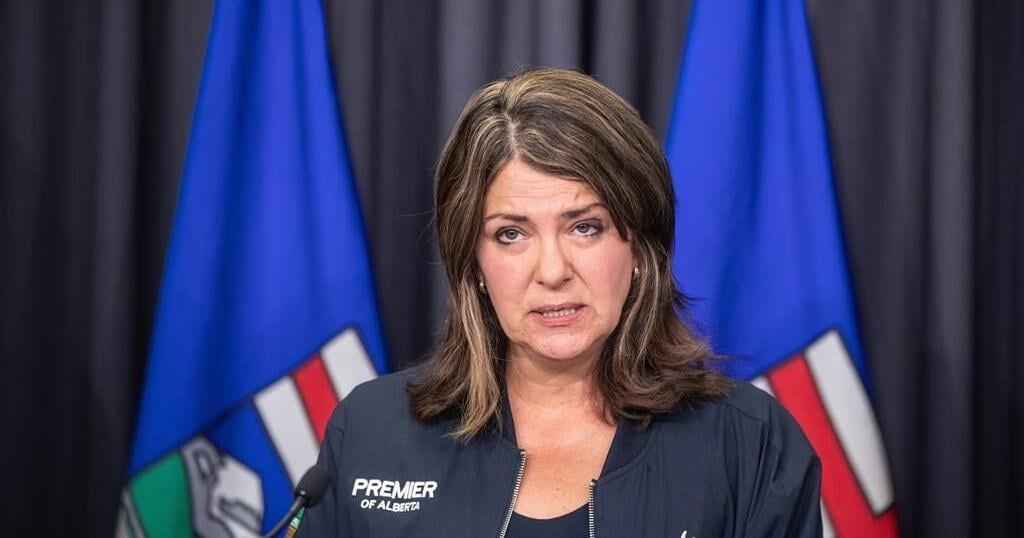CALGARY – Alberta Premier Danielle Smith says the jury has spoken and needs to be respected in the case of two men found guilty for their actions at the 2022 Coutts border blockade.
Smith has expressed support and sympathy for COVID protesters like Anthony Olienick and Chris Carbert.
But she told the Shaun Newman podcast Thursday that it was a jury that found Olienick and Carbert guilty of mischief and weapon possession at a trial in Lethbridge, Alta., last month.
“It was a jury of their peers which I think is important because a jury trial is sacrosanct in our country and our province,” Smith said when asked for her thoughts on the trial.
“They looked at the evidence, rejected some of the charges and accepted some of the others.”
She added: “I think people should feel some confidence that the jury trial system is an important part of our process and that’s the outcome that it had.”
Earlier this week, Olienick and Carbert were sentenced to 6 1/2 years in prison after the jury found them guilty of mischief over $5,000 and possession of a firearm dangerous to the public peace.
Olienick was also found guilty of possessing pipe bombs.
They were found not guilty of the most serious charge of conspiracy to commit murder.
The men were granted almost four years’ credit for the time they spent in custody awaiting trial.
They were among multiple people charged for their roles at the Coutts blockade, which halted traffic at the Canada-U. S. border crossing for two weeks in 2022 in a protest against COVID-19 rules and vaccine mandates.
The men were charged after RCMP found guns, ammunition and body armour in trailers near the blockade.
The clash between COVID health mandates and individual freedoms polarized public opinion during the pandemic, resulting in a number of demonstrations such as the one at Coutts.
Anger continued to ripple during Olienick and Carbert’s trial.
Four days into the case in early June, jurors parking their cars in front of the courthouse were greeted with a message scrawled in chalk on a sidewalk: “840 Days Plus Already, Let the Coutts Boys Out of Jail Now.”
A British Columbia man was charged with obstruction of justice and banned from the courthouse. The judge rejected a defence request for a mistrial.
Smith, a staunch proponent of individual freedoms, ran into her own problems with the COVID protests that resulted in a stinging rebuke from Alberta’s then-ethics commissioner, Marguerite Trussler.
Just days before the 2023 Alberta election, Trussler determined Smith undermined democracy and broke conflict-of-interest rules by intervening in a criminal case and pressuring her attorney general to “make it go away.”
The case involved Artur Pawlowski, who was convicted of mischief for inciting the continuation of the Coutts blockade.
Smith later apologized to the legislature chamber for her actions while the Opposition New Democrats called for a police investigation.
Smith told Newman Thursday she is now being more careful.
“Just look at what the NDP did. They wrote a letter to the RCMP asking them to investigate me under Criminal Code interference in the justice system,” Smith said.
“I take my lawyer’s advice and I can’t comment on criminal justice matters.”
Coutts-related court cases continue to work their way through the system.
Three other men identified as leaders of the Coutts blockade will be sentenced on Sept. 27 in Lethbridge.
Alex Van Herk, Marco Van Huigenbos, and Gerhard (George) Janzen were each found guilty of one count of mischief over $5000.
Van Huigenbos came to court Monday for the sentencing of Olienick and Carbert and later told reporters the pair were victims of a “highly politicized” process.
“Six-and-a-half years for these gentlemen when we have violent criminals on parole, violent reoffenders in the public and we have men here who were involved in a political protest during unprecedented times,” Van Huigenbos said.
“These men didn’t murder anybody so are we setting the dangerous precedent of thought, which they were acquitted of?”
This report by The Canadian Press was first published Sept. 12, 2024.
